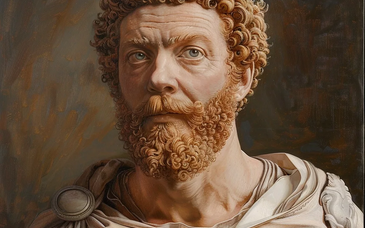The Latin words res publica which mean 'commonwealth' or 'state' is the source of today's term 'republic'.
Rome was never a democracy as we would understand it today, nor as the Greeks understood it. For Roman society and the power within it was firmly divided by class.
Most obviously, there was a division between the free and the enslaved. But the free Romans were further divided. If they were free from birth or had been released from slavery, if they were Roman citizens or Latins, if answerably to a guardian, etc...
The early Republic was solely ruled by the two upper classes, the senators, who qualified by birth and wealth, or the equestrians or knights. The latter were the second most wealthy group in Roman society. Their name stems from the fact that they were supplied, by public expense, with a horse when required for military duty.
The change from Monarchy to Republic was a gradual one. What was the King's main function, including the waging of war, was then taken care of by two consuls (initially called magistrates) of equal rank, elected for one year.
It was Lucius Valerius Publicola who decreed that the lictors, the bearers of the fasces(see Kings) were to march in front of each consul on alternate months, so that there was not to be more symbols of power under the Republic than under the Kings.
- Offices & Assemblies
- Twelve Tables
- Licinian Rogations
- Roman Treaty with Carthage
- 1st Samnite War & Latin War
- Alexander 'the Molossian'
- Second Samnite War
- Hortensian Law
- Pyrrhus of Epirus
- Rome dominant power in Italy
- First Punic War
- Roman Annexation of Sardinia and Corsica
- Carthaginian Expansion into Spain
- Second Punic War
- Wars against Macedon and Syria
- Rome in Cisalpine Gaul and Spain
- Third Macedonian War
- Roman Misgovernment of Spain
- Fourth Macedonian War
- War against the Achaean League
- Third Punic War
- Desperate Struggle in Spain
- First Slave War
- Rome inherits Pergamum
- Brothers Gracchus
- Jugurthine War
- Marius
- Second Slave War
- Social War
- Sulla
- Sulla takes Power
- Sulla's first Reforms
- Marius & Cinna take Power
- First Mithridatic War
- Sulla becomes Dictator
- Sulla's second Reforms
- The Age of Caesar
- Rise of Crassus and Pompey
- Third Slave War
- Crassus and Pompey joint Consuls
- Third Mithridatic War
- Pompey defeats the Pirates
- Pompey against Mithridates
- Pompey annexes Syria
- Pompey in Judaea
- The Cataline Conspiracy
- First Triumvirate
- First Consulate of Julius Caesar
- Caesar defeats the Helvetii, Germans and Nervii
- Disorder in Rome under Clodius
- Conference of the Triumvirs at Luca
- Caesar's Expeditions into Germany and Britain
- Pompey sole Consul
- Disaster at Carrhae
- The Rebellion of Vercingetorix in Gaul
- Caesar's Breach with Pompey
- Showdown between Caesar and Pompey
- Caesar in Egypt - The 'Alexandrian War'
- Caesar defeats Pharnaces of Pontus
- Caesar final Victory over the Pompeians
- The Murder of Caesar
- The Second Triumvirate
- Antoninus vs Octavian
- Octavian sole Ruler of Rome





